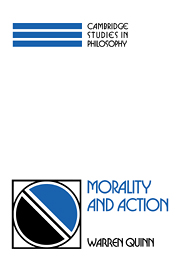Book contents
- Frontmatter
- Contents
- Acknowledgments
- Introduction
- 1 Moral and other realisms: Some initial difficulties
- 2 Abortion: Identity and loss
- 3 The right to threaten and the right to punish
- 4 Reply to Brook
- 5 Truth and explanation in ethics
- 6 Reflection and the loss of moral knowledge: Williams on objectivity
- 7 Actions, intentions, and consequences: The Doctrine of Doing and Allowing
- 8 Actions, intentions, and consequences: The Doctrine of Double Effect
- 9 Reply to Boyle's “Who is entitled to Double Effect?”
- 10 The puzzle of the self-torturer
- 11 Rationality and the human good
- 12 Putting rationality in its place
5 - Truth and explanation in ethics
Published online by Cambridge University Press: 05 June 2012
- Frontmatter
- Contents
- Acknowledgments
- Introduction
- 1 Moral and other realisms: Some initial difficulties
- 2 Abortion: Identity and loss
- 3 The right to threaten and the right to punish
- 4 Reply to Brook
- 5 Truth and explanation in ethics
- 6 Reflection and the loss of moral knowledge: Williams on objectivity
- 7 Actions, intentions, and consequences: The Doctrine of Doing and Allowing
- 8 Actions, intentions, and consequences: The Doctrine of Double Effect
- 9 Reply to Boyle's “Who is entitled to Double Effect?”
- 10 The puzzle of the self-torturer
- 11 Rationality and the human good
- 12 Putting rationality in its place
Summary
In the last half century, moral philosophers who oppose the idea of objective moral truth have tended to rely on two kinds of argument: the internalist charge that no objective judgment (other than a report of one's existing motivations) could have the kind of guaranteed relevance to decision that moral judgments have; and the relativist charge that basic moral disagreement is unresolvable. But both of these objections have, by now, been made and answered in so many ways that it is hard to assess their force. To remind us of a different, and perhaps more decisive, challenge to the possibility of objective moral truth could therefore be a service. And that is why the opening two chapters of Gilbert Harman's The Nature of Morality deserve our serious attention.
Harman develops there a forceful empiricist argument. He holds that moral claims must remain problematic and open to skeptical doubt unless they can be observationally confirmed or unless moral facts can be reduced to facts that are observationally confirmable. He also holds that hypotheses, moral or nonmoral, are observationally confirmed only if they help explain the occurrence of the observations that confirm them. But it seems clear to him that moral hypotheses never help explain why we observe anything. And he finds it far from obvious that this failure could be set aside by finding some reduction of so-called moral facts to observationally confirmable facts.
- Type
- Chapter
- Information
- Morality and Action , pp. 109 - 133Publisher: Cambridge University PressPrint publication year: 1994

